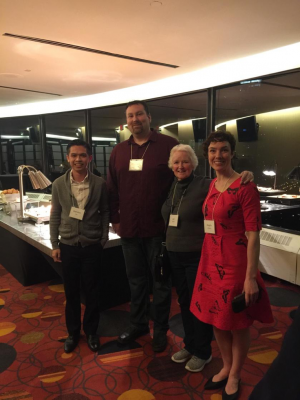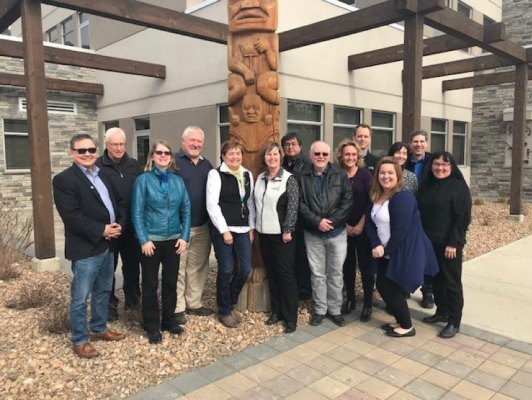I never imagined my first co-op with the Federal government would be such an amazing experience. It all began one early morning when I woke up to an email from the SFU career centre that read “Accounting/Finance Co-op Job – DEADLINE TODAY AT 3 PM!” This was my first semester seeking a Co-op and I was not used to seeing postings with such a short turnaround time. I quickly applied for the position and two weeks later, I received an email to interview with Western Economic Diversification Canada. Once I read through the organization’s goals, values and current projects, I immediately knew that I wanted to work there. I interviewed on a Friday and received a call the next business day that I was the successful candidate!

About
Western Economic Diversification Canada is a federal department that strengthens the economy of Canada’s four western provinces by focusing on business development, innovation, and community economic growth. This is done through programs and initiatives that grow small and medium businesses, supports the development of clean technology, encourages entrepreneurship, and promotes economic development in Indigenous communities.
The team I worked with was the Service Delivery Partnerships (SDP) team. They are primarily involved with two programs – the Canada 150 Community Infrastructure Program and Western Canada Business Services Network. As part of celebrating Canada’s 150 anniversary, the Canada 150 Community Infrastructure Program helped improve existing community and cultural infrastructure, like parks and sports facilities, in order to enhance the quality of life of Canadians. The Department also provides funding to community-driven organizations through the Western Canada Business Services Network to help entrepreneurs, especially those in rural communities or underrepresented groups like women and Indigenous peoples, grow and expand their businesses.

Highlights from the first 30 days
My first week in my new role went by very quickly. I watched training videos, learned how to use the internal software and databases, had lunch with my co-workers, and processed some financial claims. In the second week, my manager returned to the office and that was when I started learning more about the role.
I started the second week with a request to review an online petition, which required me to consolidate the information and figure out how to best present it to management. I started compiling the information using a “data scraper” which allowed me to pull all the information from the petition in a very short time (over 3,200 unique signers with different comments attached). The next step was to clean the data and summarize what it meant. There were comments both in English and French, from different areas of Canada, and even from people who signed the petition because they were curious about the program! Compiling the information was challenging as I began setting filters on the excel data only to find out there was many ways to spell our Canadian provinces. After a grueling day, I was able to compile and summarize the data in a two-page report, which included common themes in the comments, a breakdown of the petition responses by province, and an analysis of current themes.
Transitioning into the third week, I assisted one of the senior business officers in compiling a business report that was due in 2 weeks. The report required a breakdown of gender, low capacity communities, and indigenous population statistics. Armed with my knowledge of business writing gained from Business 360 just two semesters ago, I started to compile the detailed report and identify potential outreach targets. I spent the third week of my co-op solely on compiling information, analyzing raw datasets, and cleaning the datasets. Going into the fourth week, I worked on completing the report while also processing financial claims. This process ensured projects could be reimbursed for costs incurred, according to their contribution agreements.
The final report took a total of two weeks to write, but it was one of the more interesting parts of my first month! I had the opportunity to learn more about the communities that I am currently working with and developed a better understanding of issues facing each rural community. The process of seeing a community name and then understanding the information behind it allowed me to put a face to the name. Especially the opportunity to analyze raw datasets brought back memories of Bus 462 and the various issues arising from compiling the information!
What I learned from my first Co-op term
Nothing could have ever prepared me for the work I had done during my co-op term. In a perfect world (school), you are given all the information. There is not ambiguous information and what you get in a message is what you are tasked to do. Coming into co-op, I thought I knew everything and that it would be a piece of cake. I could not be more wrong! I compiled reports, processed financial claims, and reviewed operational plans while completing risk assessments. Even the basic task of “report on all active projects” proved to be challenging. I compiled a report on information I thought would be important to my manager but it turns out the data was too fine and granular. This meant that while the information was useful and detailed, it was not very helpful to my manager because she only wanted to see the big picture!
This lesson taught me that you need to identify your audience. Information that is provided to the right person, at the right time, and in the right format is more useful than just doing a data dump and hoping someone finds it useful. I am still improving on this, but being able to learn how to create reports for different people has been helpful. This is one of the more valuable lessons I have learned because many students can learn how to process a financial claim, or compile information. However, the challenge is determining what sort of information the person you are compiling the information for needs.
My advice coming into co-op
One valuable tip I wish someone else had told me is to take advantage of the resources offered to you. I was and still am hesitant to ask for help, but know your coworkers are there to support you. They all want you to succeed as much as you want yourself to succeed and that is why it is critical to ask for help when you need it! Take advantage of resources that are available to you including attending social events, corporate events, and corporate workshops. During my time as a co-op student, I had the opportunity to listen to a workshop presented by our Deputy Minister on “How to effectively brief”. The workshop provided valuable information on identifying your audience, identifying knowledge gaps, and how to improve on it in the future by putting yourself in the shoes of the media, the presenter and the recipient. I also had a chance to work on some projects and meet the people during a networking event entitled “Community Futures Training 2018”. At this event, I networked with the current managers, business analysts and board chairs. It put into perspective the work I was doing and the difference I was making.
Conclusion
My first co-op experience with Western Economic Diversification was one of the most interesting and valuable experiences I have had. Being able to work for the Canadian federal government, you might assume it is a 9-5 job and then you go home. However, it is what you make of it that counts. The people you get to work with come from a variety of backgrounds and are there to ensure you succeed. If you take the time to socialize, meet with your peers, and get to know each one on a personal level, you will gain valuable experience, make friends and enjoy your time on the job!
Bio
Brendan is a BBA candidate pursing a concentration in Management Information Systems (MIS), certificate in Management Information Systems, and an external certification called The Open Group Architectural Framework (TOGAF). He enjoys helping students as a teaching assistant and is actively involved in the Beedie community. With a passion for IT architecture, his current co-op experience has allowed him to understand IT and business processes in federal government. Connect with Brendan Hoy on Linkedin.